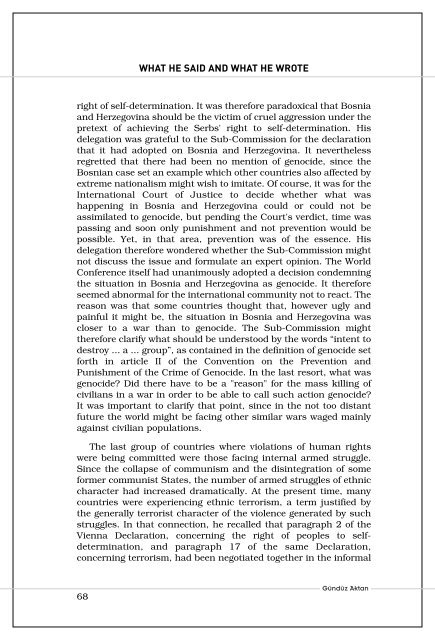gunduz-aktan-kitap-soyledikleri-ve-yazdiklari
gunduz-aktan-kitap-soyledikleri-ve-yazdiklari
gunduz-aktan-kitap-soyledikleri-ve-yazdiklari
You also want an ePaper? Increase the reach of your titles
YUMPU automatically turns print PDFs into web optimized ePapers that Google loves.
WHAT HE SAID AND WHAT HE WROTE<br />
right of self-determination. It was therefore paradoxical that Bosnia<br />
and Herzegovina should be the victim of cruel aggression under the<br />
pretext of achieving the Serbs' right to self-determination. His<br />
delegation was grateful to the Sub-Commission for the declaration<br />
that it had adopted on Bosnia and Herzegovina. It ne<strong>ve</strong>rtheless<br />
regretted that there had been no mention of genocide, since the<br />
Bosnian case set an example which other countries also affected by<br />
extreme nationalism might wish to imitate. Of course, it was for the<br />
International Court of Justice to decide whether what was<br />
happening in Bosnia and Herzegovina could or could not be<br />
assimilated to genocide, but pending the Court's <strong>ve</strong>rdict, time was<br />
passing and soon only punishment and not pre<strong>ve</strong>ntion would be<br />
possible. Yet, in that area, pre<strong>ve</strong>ntion was of the essence. His<br />
delegation therefore wondered whether the Sub-Commission might<br />
not discuss the issue and formulate an expert opinion. The World<br />
Conference itself had unanimously adopted a decision condemning<br />
the situation in Bosnia and Herzegovina as genocide. It therefore<br />
seemed abnormal for the international community not to react. The<br />
reason was that some countries thought that, howe<strong>ve</strong>r ugly and<br />
painful it might be, the situation in Bosnia and Herzegovina was<br />
closer to a war than to genocide. The Sub-Commission might<br />
therefore clarify what should be understood by the words “intent to<br />
destroy ... a ... group”, as contained in the definition of genocide set<br />
forth in article II of the Con<strong>ve</strong>ntion on the Pre<strong>ve</strong>ntion and<br />
Punishment of the Crime of Genocide. In the last resort, what was<br />
genocide Did there ha<strong>ve</strong> to be a "reason" for the mass killing of<br />
civilians in a war in order to be able to call such action genocide<br />
It was important to clarify that point, since in the not too distant<br />
future the world might be facing other similar wars waged mainly<br />
against civilian populations.<br />
The last group of countries where violations of human rights<br />
were being committed were those facing internal armed struggle.<br />
Since the collapse of communism and the disintegration of some<br />
former communist States, the number of armed struggles of ethnic<br />
character had increased dramatically. At the present time, many<br />
countries were experiencing ethnic terrorism, a term justified by<br />
the generally terrorist character of the violence generated by such<br />
struggles. In that connection, he recalled that paragraph 2 of the<br />
Vienna Declaration, concerning the right of peoples to selfdetermination,<br />
and paragraph 17 of the same Declaration,<br />
concerning terrorism, had been negotiated together in the informal<br />
68<br />
Gündüz Aktan



